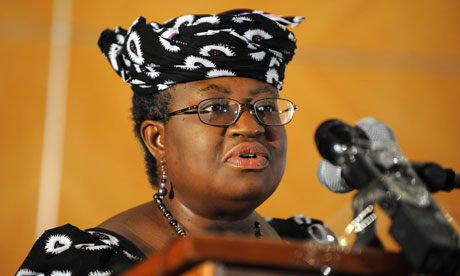Traditional award of top job to a White House favourite looks increasingly difficult as developing world candidates emerge
Heather Stewart
Thursday 22 March 2012
Guardian.Co.UK:
A credible World Bank candidate: Nigeria's finance minister, Ngozi Okonjo-Iweala. Photograph: Pius Utomi Ekpei/AFP/Getty Images
Barack Obama is scrambling to find a heavyweight US candidate to stand for the job of president of the World Bank, with the deadline for nominations looming.
Two credible developing country candidates – Ngozi Okonjo-Iweala, the Nigerian finance minister, and José Antonio Ocampo, the Colombian former finance minister and development economist – have already joined the race, together with the American economist Jeffrey Sachs, who has the backing of several developing countries.
The calibre of the field means the US won't be able to stitch up the job, as is traditional, by handing it to a faceless White House bureaucrat or a favoured presidential lieutenant.
Instead, Obama has been casting around for a figure with the requisite gravitas to lead the international field. Hillary Clinton, the US secretary of state, has long been touted, but has denied that she wants the job, and is thought to want another shot at the presidency.
Larry Summers, the former treasury secretary and once an adviser to Bill Clinton, has the backing of his successor, Tim Geithner – but he is highly controversial with many in Europe and the developing world, because he is seen as an outspoken advocate of the deregulation that led to the financial crisis. Susan Rice, America's ambassador to the UN, has clashed with China and Russia over the crisis in Syria. Rumours of other wildcard candidates, including PepsiCo boss Indra Nooyi – whose Indian origins might give her an edge with the Bric countries – and even Bill Gates, have been swirling in Washington.
Ever since the Bretton Woods institutions were founded, in the aftermath of the second world war, the Bank has been run by an American, and the International Monetary Fund by a European, under a gentleman's agreement. But as the emerging economies, including China, India and Russia, have won greater influence at the Washington-based lender there has been a growing chorus calling for a candidate from outside the west.
When Dominique Strauss-Kahn stepped down ignominiously from the top job at the IMF last year the formidable Christine Lagarde had been swiftly nominated and backed by a series of European countries, including the UK, before any credible rival could get out of the blocks.
But with World Bank boss Robert Zoellick departing in a more conventional fashion this summer, after serving a notice period, there was no excuse for anything but the open nomination process the Bank has long promised. A Department for International Development spokesperson said: "Britain supports an open and transparent selection process. All candidates for the job must be considered on their merits."
The Bank is not expected to make a formal announcement about who has been nominated, but will publish a three-strong shortlist next week, and the candidates will then be interviewed by its board.
Most seasoned World Bank-watchers expect the ultimate outcome to be that an American gets the job: the US still has a dominant voice at the Washington-based institution, and Obama won't want to look weak by ceding a major source of international influence in an election year.
But in the wake of the global financial crisis, emerging world powers such as Brazil and China have become increasingly critical of the assumption of the US and Europe that they know best.
If Obama fields a weak or a controversial candidate against the seasoned operator and World Bank veteran Okonjo-Iweala, there is sure to be a noisy backlash. As Liz Stuart, senior policy adviser for Oxfam, says: "I think we can assume there are lots of talented people who work in development who aren't American."
Who's in the running?
Ngozi Okonjo-Iweala: Nigerian finance minister for the second time, and the developing country candidate to beat. As a former World Bank managing director, she knows the institution inside out. She has also been on the front line of tackling poverty and corruption at home, and fought for debt relief from the West.
José Antonio Ocampo: a former Colombian finance minister who studied and is based at Columbia University, in the US. He is a heavyweight academic economist who has had first-hand experience in government in a developing country, and held a senior UN post. He has won Brazil's backing.
Hillary Clinton: still widely rumoured to be the most likely US candidate. But she has repeatedly said she doesn't want the job and her hardline attitude to human rights abuses in her current job as secretary of state is said to have made the Chinese sceptical about her candidacy.
Jeffrey Sachs: US economist and author, now at Columbia University, says he has the support of several developing countries, many of which he has advised over the years. He too is controversial because of questions over his role in Russia's "shock therapy" economic reforms in the 1980s. He's also seen as too liberal to win the backing of the White House.
Susan Rice: US ambassador to the United Nations. She is used to charming her way through international diplomatic circles – a key part of the job of a World Bank boss – but she may not be well-known enough to trump Iweala and allow America to hold onto its supremacy at the Bank.

No comments:
Post a Comment